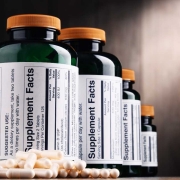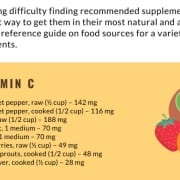Do You Know What’s In Your Dietary Supplement?
In 2015, several well-known chains – Wal-Mart, Walgreens, Target & GNC – were served cease & desist notifications by the New York State Attorney General’s Office to stop selling their store brand supplements. This followed an investigation that found, not only did they contain several ingredients not identified on their labels as an ingredient, in many cases the herbal supplement itself was not actually present.
The case brought to light some of the major problems in the supplement industry a decade ago, ranging from baseless claims to fraudulent manufacturing and marketing. Unfortunately, these issues still persist today and as the supplement industry continues to grow, so does the potential of harm to unsuspecting individuals. How did we get to this point, and more importantly, what can we do about it?
Many people assume that the US Food and Drug Administration regulates the manufacture and marketing of dietary supplements to the same extent as prescription and over-the-counter medications, but the reality is that it doesn’t. In 1994, the Dietary Supplement Health and Education Act (DSHEA) became law, effectively taking the FDA out of the process of approving and monitoring dietary supplements. Consequently, the manufacturer alone is responsible for ensuring that its supplements are safe, effective, and free of impurities and contaminants. Furthermore, the manufacturer is solely responsible for ensuring that its products’ information labels are “truthful and not misleading.”
Since 2007, supplement manufacturers have been legally required to promptly report any serious injuries or illnesses related to the use of their products. When the FDA is notified that someone has suffered an adverse reaction from taking a supplement, the agency is responsible for investigating the report. The FDA is also obligated to notify consumers about any safety issues they discover.
In contrast, US drug manufacturers are required to make a full report on all adverse events to the FDA, and for an event that is regarded as both serious and unexpected, the report must be made “as soon as possible, but not later than 15 days after” it becomes known.
So where does this leave you, the consumer? Frankly, it can be difficult to determine if a product is going to be safe and effective for you.
Before taking any dietary supplement, consider the following.
1. How can I know if a supplement will be safe and effective for me?
Buy from a trusted source. At the Kaplan Center, we carry pharmaceutical-grade supplements that our physicians have found to be safe and effective after reviewing independent research. We make sure that the supplements we offer are “as labeled,” ie. 5,000 iu of Vitamin D3 on the label ensures that 5,000 iu of D3 is present in each pill in the entire bottle. In addition to reviewing the independent product research, our physicians closely observe how patients respond to products, ensuring that supplements safely complement the other medications and treatments the patient is taking. The majority of supplements we offer at Kaplan Center also do not contain common allergens such as gluten and soy. Our medical staff understands the potential for adverse reactions and are happy to answer questions about the effectiveness and potential side effects of any supplement being considered.
Once you establish a trusted supplier, make sure to read the label on the product packaging. Ask your physician for advice, and use the internet to find any scientific research that may have been conducted on the product. The National Center for Complementary and Integrative Health (NCCIH) and the National Institutes of Health (NIH) Office of Dietary Supplements (ODS) offer free information about supplements on their websites. If you decide to take a supplement, follow the dosing directions on the package or the modified dose recommended by your own doctor.
2. I take some prescription medications; will taking a dietary supplement cause an adverse reaction?
It could, so you should check with your physician before taking any dietary supplement. Also, before starting any new medication (prescription or over-the-counter), tell your doctor about the dietary supplements you are taking. Supplements can interfere with the proper metabolization of medication, and visa-versa.
3. Is it possible that the nutritional deficiency I am seeking to address by taking supplements is a symptom of an underlying medical problem that needs to be diagnosed and treated?
Yes! If you have a nutritional deficiency combined with chronic pain, fatigue or depression, you may have an underlying medical disorder. Make sure to talk with a physician who has successfully treated nutritional deficiencies caused by food intolerances or allergies such as leaky gut syndrome, or autoimmune diseases such as celiac disease, as these can interfere with your body’s ability to absorb vital nutrients. If an undiagnosed medical problem is causing a nutritional deficiency, it should be addressed prior to, or in conjunction with, taking supplements.
Take control of your health. This includes having a discussion with your physician about any supplements you are taking or considering taking. Don’t be tempted by marketing strategies and fancy labeling in an industry where the manufacturers supervise themselves. As a consumer, you should consider product research, lab testing, and safety records when making your buying decisions.
Our physicians have years of experience prescribing herbal remedies and nutritional supplements and will ensure that you are directed to only the highest quality products available in today’s market.
This article first appeared in Dr. Kaplan’s column on MindBodyGreen.com in March, 2015. It was reviewed in April, 2024.











Leave a Reply
Want to join the discussion?Feel free to contribute!